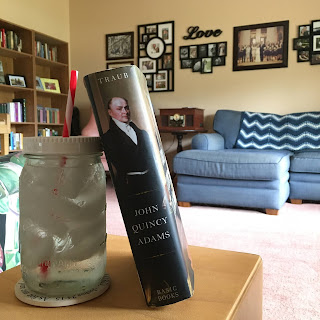It. Is. Finished. It took me way too long to read this biography, and I have two more (both about Andrew Jackson) on my list for 2020. I technically began reading this one the first week of February, but given the pandemic and stay home orders and general madness of the world, I largely ignored JQA until June. I think between the time I started in February and June 1st, I only managed eight or nine chapters. I finally buckled down last month and finished up this 540-page biography last week. I still have a stack of books waiting to be recapped siting in my reading nook, but I have to be pretty quick on the turnaround with my presidential biographies before everything I learned falls back out of my head.
That being said, let's get after it.
John Quincy Adams: Militant Spirit by James Traub was published in March of 2016. I originally intended to read a biography of our nation's sixth president written by Harlow Giles Unger, but after reading his laughably biased biography of Monroe last year, I got rid of the Unger biography of John Quincy Adams and picked up this one by Traub instead. Which led me to make a new rule in my quest to read through the presidents: no back-to-back biographies by the same author. I think reading about the same period of history and men who worked together from different authorial perspectives will be more beneficial than just getting one person's take.
Traub certainly put together an excellent biography. He managed to be comprehensive without bogging it down with too much detail. He interwove Adams' political and personal life seamlessly throughout the entire biography which I really appreciated. (Other biographers sometimes have the tendency to focus wholly on the political component forgetting altogether the human side of their subjects.) His biography was readable and insightful, and if you're looking for a good bio of John Quincy Adams, I would definitely recommend this one.
However, John Quincy Adams himself is not fun. He was a consummate politician, and, even more so than Madison, politics were his entire life. He was the first (and only) president to serve in the House of Representatives after his presidency (instead of having the good grace to retire) and he literally died in the House during the congressional session of 1848.
Adams served as the U.S. ambassador to the Netherlands, Portugal, Prussia, Russia, and Britain under Washington's, his father's, and Madison's administrations. He took on the role of U.S. Senator (from Massachusetts) during Jefferson's administration, and he worked tirelessly as Secretary of State under Monroe's administration. There is absolutely no logical reason he should have been elected president over Andrew Jackson, and he spent his one term in office largely ineffectual because of his stubborn political idealism. Harrison Gray Otis, a contemporary of John Quincy Adams, characterized the entire line of Adams men as "a peculiar species of our race exhibiting a combination of talent & good moral character, with passions and prejudices calculated to defeat their own objects & embarrass their friends." I found this to be a penetrating insight and discerning assessment of John Quincy Adams in particular.
After his presidency, during his time in the House of Representatives, Adams took up the cause of petitions, particularly anti-slavery petitions, and bullheadedly fought the gag rule imposed by the Democrat-ruled House. While being vehemently opposed to slavery morally, Adams did not think Congress had the right to legislate slavery, and he was not an abolitionist though he did believe slavery would eventually be eradicated. I actually found this period of his life—specifically his political life—the most interesting to read about.
On a personal level, I never would have been friends with John Quincy Adams. He was a terrible husband, and he and Louisa had a pretty miserable marriage. He held his sons to impossible standards, and was only outlived by his youngest son Charles, the only son he ever cultivated a good relationship with. Solid friendships were conspicuously absent from this biography. He is the first president I've read about who seemed to have no outstanding friendships or correspondence with other colleagues. While those who worked closest with him did seem to grudgingly respect him, he really didn't get along with anyone for long.
One of my favorite bits of this whole biography was actually the account of Louisa's solo trip from Russia to France during Napoleon's bloody Hundred Days War. Louisa Catherine Adams was, honestly, a somewhat pathetic character (I mean, you can hardly blame her given who she was married to and the fact that she had to endure miscarriages, very difficult pregnancies, and the deaths of all her children excepting Charles), but she really bucked up and took to this six week adventure with gusto. It really makes you wonder what her life would have been like if she had married a warm, attentive partner rather than the austere and somewhat neglectful John Quincy Adams.
All in all, good biography; less-than-stellar subject. If you're on a similar quest to read through the American presidents, this would be a great biography for you when you get to John Quincy Adams. If you're not particularly interested in JQA, I can't really blame you. He was a total killjoy.
Next up: Andrew Jackson.
Have you read any good biographies or non-fiction lately? Do you have any specific lofty reading goals? I think my two biggest ones are: 1) reading a biography of every U.S. president, and 2) reading the complete works of Shakespeare. How are your 2020 reading goals coming along?

No comments:
Post a Comment